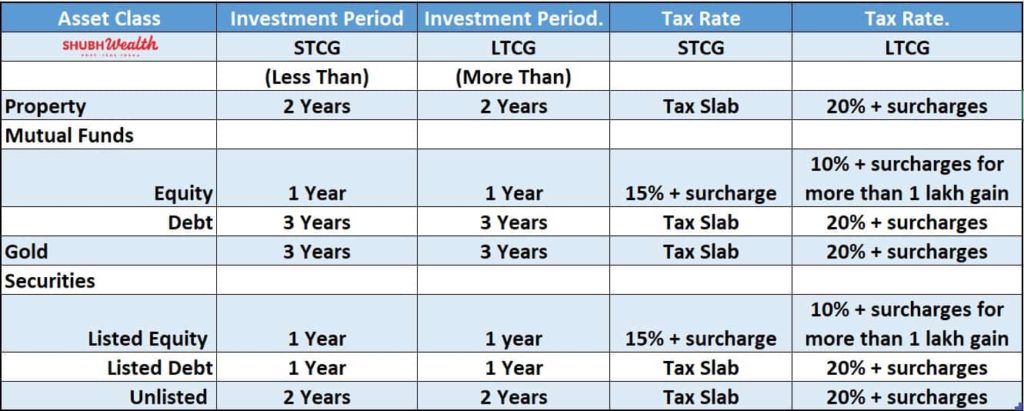What is Capital Gain?
Capital Gain is profits that arise from the sale of capital assets like mutual funds, Property, Gold, and Stocks.
These gains can be of two types LONG TERM and SHORT-TERM. The holding period of these assets before you sell determines whether the profits are long term or short-term gains.
- In Mutual funds, the long-term Capital gains qualify after one year of holding in Equity Mutual funds and three years for Debt mutual funds.
- Real Estate gains qualify for Long term capital gains if you sell after two years of buying it.
- Holding three years or more qualifies for the profits to be LONG term in Gold.
- Unlisted securities qualify for long term capital gain after two years of holding.
- Debt Securities (like debentures, bonds, govt securities, etc.) and Equity Shares listed on a recognized stock exchange in India are eligible for long term gain after one year.
Tax rates are different for various asset classes for The Long term Capital gain (LTCG) tax calculation. (refer table 1.1) Indexation benefits are not applicable for listed Equity shares and equity mutual funds.

Do read Below mentioned link for investment in Listed Debt like Bonds and debentures.
What is Indexation?
The reduction in gain due to an increase in acquisition cost (purchase cost) for a minimum specified period is INDEXATION.
An investor holding the assets for a specified period qualifies as Long term capital gain (LTCG). The increase in purchase cost according to the cost inflation index (CII) thus reducing actual capital gains for tax calculation is INDEXATION BENEFIT.
Short term capital gain(STCG) is defined as holding of assets for a period that is less than specified for long term capital gains.
How to calculate Indexation cost?
To calculate the indexation cost, we need to refer to the Cost Inflation Index (CII) data published by the Central board of direct taxes (CBDT) every year. CII data is published considering inflation in the country on various goods and services. One can visit the below-mentioned link to get Index numbers for specified periods.
https://www.incometaxindia.gov.in/Charts%20%20Tables/Cost-Inflation-Index.htm
Steps to calculate the indexed cost for assets are
- Get the CII number for the year asset purchased and sold
- Calculate the inflated cost
- Multiply the purchased cost by CII number of sale year and divide the value by CII number of asset purchase year (See illustration-Index benefit calculation)

The CII numbers are available from FY 2000-01 onwards as it was revised in Union budget 2017-18. Any purchase before that has to ascertained through Fair Market Value (FMV) as on 2000-01 or actual cost, which every you want to consider.
Calculation of Indexation benefit
Once an investor ascertained the Indexed cost, we need to calculate the profit which one gets after indexation cost.
There is a 2-fold benefit of Indexation
- There is no tax on the inflated cost
- Gaines after deducting indexed cost has to be paid at the applicable rate (refer table 1.1) + surcharges irrespective of your applicable tax slab.
- Investors in a 30% tax bracket have the highest benefit of Indexation.
Do note that availing INDEXATION BENEFIT is optional. The investor can calculate their tax outgo with or without indexation cost. The benefit of two can opted for tax calculation.
Conclusion
You can reduce the tax burden arising from gains accrued from selling certain assets like property, gold, securities, and Mutual funds. With the help of INDEXATION BENEFIT, capital gains can be reduced.
The Indexation benefits are twofold. One by inflating the purchase cost for the holding period, second by lower tax rate on the remaining gains. Do remember that, Indexation benefit applicability is optional.
The inflation cost directly impacts the CII numbers published. This means higher inflation leads to higher CII numbers. The capital gains tax will reduce with a higher CII index number as your gains will reduce. Shubhwealth.






Pingback: How to earn Higher Tax-efficient return than Fixed Deposit or Debt Mutual Fund? • ShubhWealth
Pingback: 4 Best Child Investment Plans (Mutual Funds) • ShubhWealth
Pingback: All About Debt Mutual Funds • ShubhWealth
Pingback: Choose Best mutual fund or Right mutual fund | Criteria and tips
Pingback: Do you know How to make International Investments? Know Simple tips